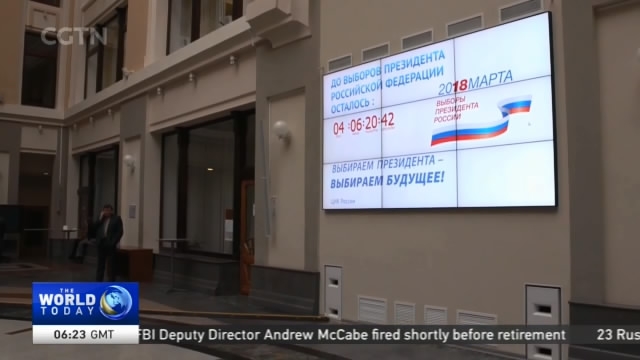
14:53, 17-Mar-2018
Russia Election: Election officials confident in blocking possible cyber attacks

With Russia's presidential election set for Sunday, election officials say they're bracing for possible outside attempts to interfere in the results. Nikolai Patrushev, the head of Russia's National Security Council, says cyber attacks launched from abroad are to be expected. But as CGTN's Aljosa Milenkovic reports – the officials are ready to defend the voting.
This is the headquarters for all federal elections in Russia. The Central Election Commission. The place where all the March 18 election ballots will come for final counting. In the main conference room, heads of this institution publicly addressed some of the reported irregularities, but none were related to possible cyber threats. That may be because officials here are confident in their system.
NIKOLAY BULAEV DEPUTY HEAD OF THE CENTRAL ELECTION COMMISSION "Regarding interfering into results of the election, we do have here in Russia a system for the state elections, which is autonomous, local and not connected to the outside world and to enter into it is possible only with the physical breakage, with an excavator or something similar. To enter into it through the internet is not possible."
Here are the starting points of the system. Voting stations, ballot boxes. Since electronic voting was first introduced in 2004, the system has been constantly updated. Here is what happens after a voter casts a ballot.
MAKSIM GAYDUKOV LEADING ADVISOR, THE CENTRAL ELECTION COMMISSION "After the voting has finished, the protocol is to print the results, which will then be signed by local election commission members. The results are also transferred to this memory stick as well. Then both are taken to a higher election commission level, where they are compared. If they are the same, then the electronic version is sent to the election mainframe."
But now, with concerns about foreign interference coming from National Security Council head Nikolai Patrushev-- and ever-rising tensions with the West, the system is getting new scrutiny – about whether it's truly hack proof.
OLEG DEMIDOV CYBER SECURITY EXPERT, PIR CENTER "I'd say that in fact the real risk is not high. There is a possibility of disrupting work of the system at some separate junction points. Meaning processing of the data that are collected from some election stations, or some other, separate information, because there are always some weak spots, weak points."
But, as Oleg said, that this threat exists with even a possibility of happening speaks more to the worsening relations between Russia and the West.
ALJOSA MILENKOVIC MOSCOW "The trading of the cyber-blows between the West and Moscow has become almost routine. Both sides accuse the other of influencing their elections through cyber-espionage or by blocking certain websites. It's the Russian presidential election in the cyber spotlight this time around. Aljosa Milenkovic, CGTN, Moscow."

SITEMAP
Copyright © 2018 CGTN. Beijing ICP prepared NO.16065310-3
Copyright © 2018 CGTN. Beijing ICP prepared NO.16065310-3